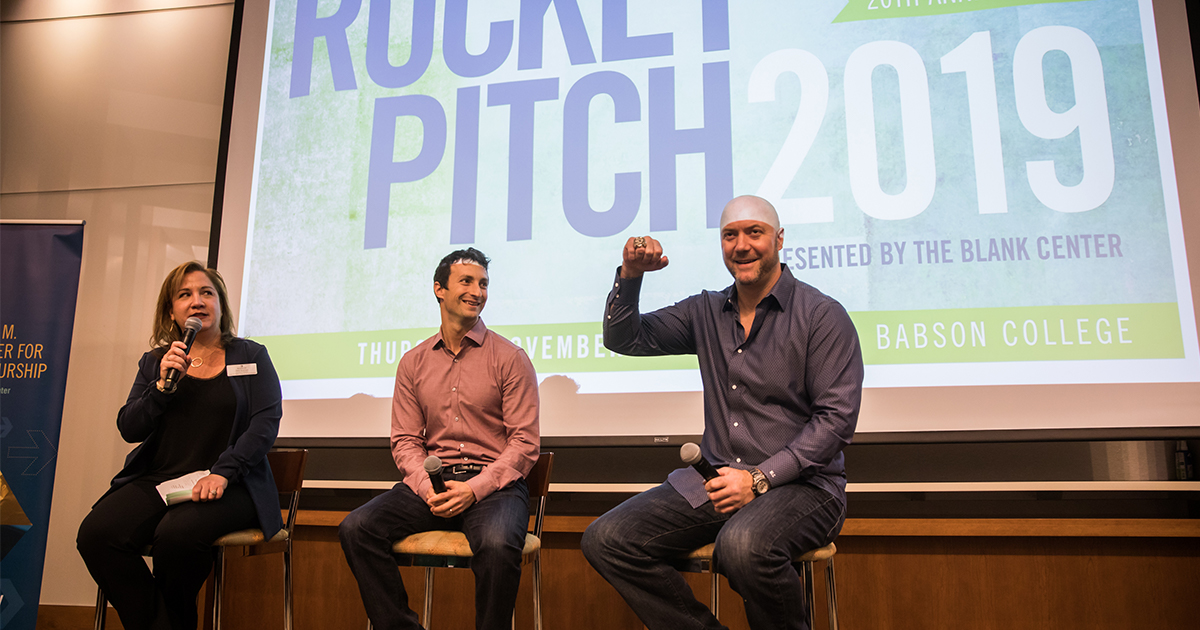A Super Bowl Champion, a Social Innovator, and a Babson College Tradition

“We have 48 entrepreneurs who are making pitches and we have some rules for today,” opened Babson College Vice Provost for Global Entrepreneurship Leadership Candida Brush. “For the entrepreneurs: three minutes, three slides. That’s been a rule for 20 years and it still stands. And, for the audience: give feedback, network, and get involved.”
At the 20th annual Rocket Pitch—a tried and true Babson event that invites student and alumni entrepreneurs from Babson, Olin, and Wellesley colleges to pitch their business ideas—there was no shortage of excitement.
To kick off Global Entrepreneurship Week, Babson also welcomed alumni and Rocket Pitch veterans Matt Chatham MBA’11 and Jon Feinman MBA’10 to a special Fireside Chat for students and attendees.
Super Bowl Champion Turned Entrepreneur
Chatham is a three-time Super Bowl champion for the New England Patriots, commentator, and the founder of Skycrepers, a scalable, fast-serve food model. Chatham is currently a college football commentator on ESPN, and has a sizable Twitter following, where he posts food-related videos.
Chatham had an interesting take on his initial Rocket Pitch.
“My first business pitch was more, ‘I love my brand,’ and I didn’t really think it through very much,” said Chatham. “Over time, you learn some of the barriers to an idea,” said Chatham, reflecting on the lessons he learned from that experience. Chatham didn’t give up.
“The second pitch I did was for Skycrepers. I had this idea for a fast-serve, assembly-line kind of thing for something I had IP for,” said Chatham.
“So by year two, I kind of knew what I was doing. The slides made more sense. It’s the believability behind the credibility,” said Chatham.
In other words. “The work that you’ve done, to what extent you actually understand it, and how backed are you,” said Chatham.
Babson Grad Lifts Youth
Feinman is the founder and executive director of Inner City Weightlifting, a nonprofit organization established in 2010 that works to reduce youth violence and incarceration rates by fostering social inclusion and promoting economic mobility through education and job training.
When describing his first Rocket Pitch, Feinman said: “Objectively, I think it was the worst pitch I have ever given. I tried using a video that didn’t work and I did the pitch before talking to the people we were going to work with,” said Feinman.
Feinman learned from his mistakes. “Had I not done that Rocket Pitch, and had I not gotten my hands dirty so to speak, there’s a good chance we never would have gotten this business off the ground in the first place,” said Feinman.
What They Learned
When it comes to Rocket Pitch, these veterans have learned a few golden rules.
“If you’re talking about slides, if you’re talking about a demonstration in the moment, a JPEG or a brief video can be powerful,” said Chatham. “Conversely, if you simply throw a brand up on the board and you don’t tell the story visually, it’s going to fall flat,” he said.
For Feinman’s audience, he tries to find the sweet spot. “We work with people who have been affected by mass incarceration but that human connection doesn’t matter to everyone,” said Feinman. “So there’s a real balance to figure out how you’re going to be true to yourself and how you’re going to get people to the table,” said Feinman.
Another element to an effective pitch, says Chatham, is speaking in a way the audience can understand. “One of the biggest issues is not talking over their heads—it’s huge in a Rocket Pitch,” said Chatham. “If you’re absolutely passionate about your business, and only 3% of the audience cares or knows what you’re talking about, that’s a big problem,” said Chatham.
Feinman suggests embracing the process. “Yes, it has to be engaging, but you also have to be willing to learn. The pitch is never going to stay the same and we’re all going to make mistakes,” said Feinman.
The Babson Difference
Both guests spoke highly of their experiences at Babson College.
“The value for me was just broadening my knowledge base and expanding on my network. If you want to go into something, you need to meet people who know what they’re doing, and Babson was phenomenal for me to do that,” said Chatham.
“For me, it was the resources, the culture, and a community that’s really oriented toward doing,” said Feinman. “I don’t think there’s anywhere quite like Babson when it comes to that.”



